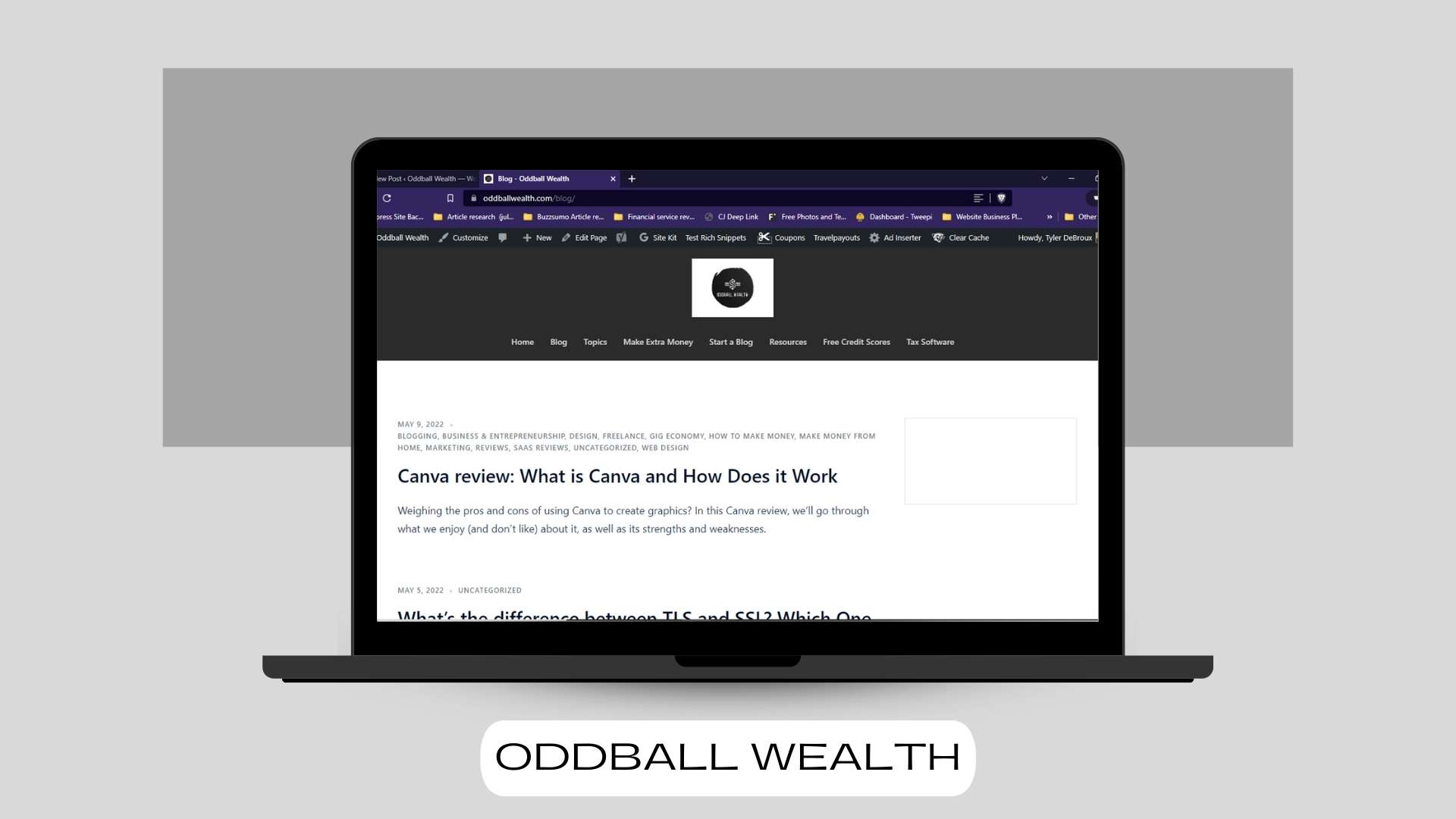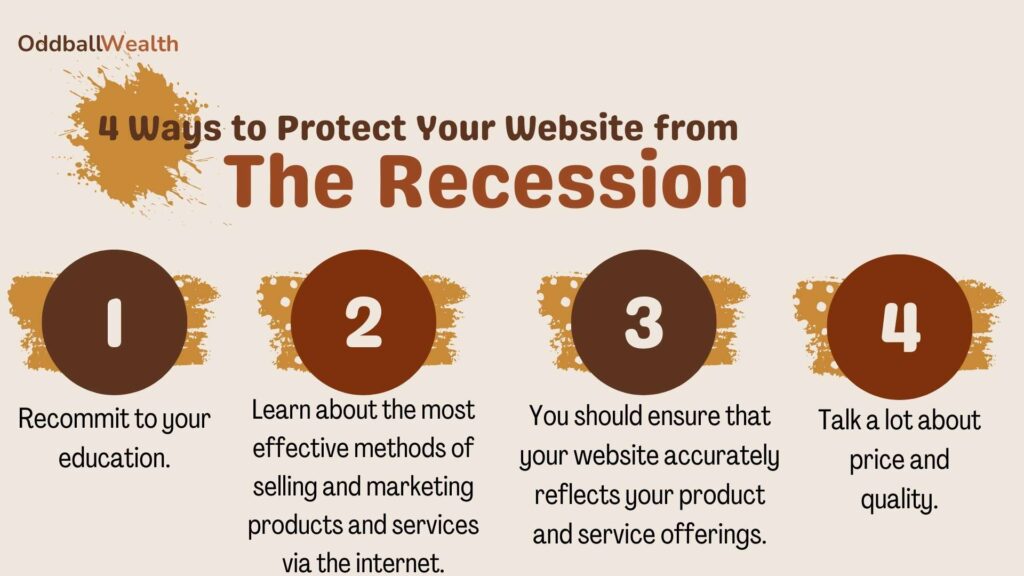
Now is the time to take these four steps to prepare for a possible economic downturn and recession proof your business.
4 ways to protect your website from the recession
- Recommit to your education.
- Learn about the most effective methods of selling and marketing products and services via the internet.
- You should ensure that your website accurately reflects your product and service offerings.
- Talk a lot about price and quality.
Latest Posts from the Blog:
- WordPress Landing Page Builders: Ultimate Guide to Creating High-Converting Squeeze Pages
- WordPress Membership Sites: Ultimate Guide to Membership and Community Websites
- WordPress Sales Funnel Builders: Ultimate Marketing and Sales Automation Guide
- Lead Capture WordPress: Ultimate Guide to Exploding Your Email List
- WPFunnels vs ClickFunnels: Ultimate Showdown for Conversion-Hungry Entrepreneurs
Times of prosperity have a way of making people complacent and sluggish.
Every time there is a major economic downturn, there are tales of businesses acting as if they believe the good times will continue indefinitely.
Of course, in hindsight, everything is clearer. We can’t go back in time and warn our younger selves, but we can better prepare for the future.
Here in 2022, we’ve only recently been hit by a downturn. There are now rumblings of yet another economic downturn.
According to various experts, the economy will continue to grow even as inflation and geopolitical turmoil continue to rise.
It’s always best to be prepared, regardless of the situation.
To avoid repeating the mistakes made by many economists and businesses, experts seem to temper any optimism in their forecasts, even if they are optimistic.
It can be very frightening for small and medium-sized businesses to hear that the economy is about to turn around. However, if you have a strategy in place, you can weather the storm and emerge from it stronger.
To succeed, you must know where to put your efforts.
Your company’s website should be at the top of the list. Your website can be your best salesperson all the time if it is properly designed. As a result, optimizing it before a downturn is critical to your company’s survival.
As you’ll see below:
- Your website can be recession-proofed in four ways.
- Steps you can take right now to get started in the real world.
- The right mindset for a recession.
Building a recession-proof website for your business
The pandemic has heightened the focus on your website that every potential customer has. People rely on an up-to-date website and Google My Business profile to know if you are open for business when so many things are in flux.
It’s not a surprise that visitors to your website form impressions about the quality, health, and professionalism of your business based on what they see.
We’ve written extensively about the significance of having an excellent website for informing your target audience and generating high-quality leads. During a downturn, the right website can help your business stay afloat by increasing traffic and attracting new customers.
Learn how to get your website ready for the impending storm.

1. Reaffirm your commitment to education.
Your website’s primary goal is to help visitors become customers by providing them with the information they need. Your website should be the most relied-upon educational resource in your field to achieve this goal.
In good times and bad, this should be the case.
Prospects form lasting bonds with the help of a reputable educational resource. Customers are more likely to buy from you now or in the future if they do their homework and discover that you have the answers and solutions to their problems.
Trust-based relationships are more critical than ever during a recession. When the economy is in a downturn, buyers are even more cautious with their cash. Any purchase they make will be the result of extensive investigation on their part.
Follow the 5 Five Customer Wants Model
You need to address clients’ most often asked questions in order to create trust. In the end, your customers want to know:
- Exactly how much it will set them back.
- How it stacks up against other options.
- What are the probable downsides or shortfalls of this solution.
- What previous customers had to say about it.
- What are the best alternatives to keep in mind.
To ensure that your customers are well-informed, your website should provide content on all of these areas.
Customers can have faith in a company that responds truthfully to questions. Businesses that have a good reputation are more likely to survive in a recession.
Ways to get started right away are as follows:
- Focus on the questions your customers are asking you.
- Build a reputation as an authoritative source in your profession by focusing on the 5 five customer wants (listed above) and developing content around them.
- A learning center should be built inside your website.
2. Learn the best practices for digital sales and marketing.
While it’s important to educate your customers through your website, it’s equally important to invest in the education of your employees. In the event of a downturn, it is imperative that you keep on top of your game in all aspects.
Professionals who attended industry events to socialize instead of advancing their own knowledge and skill sets were missing out on an opportunity to learn and grow.
Each team member’s ability to perform at a high level is critical during times of uncertainty. Your sales team must be well-versed in the utilization of digital assets during the sales cycle. SEO best practices must be kept up to date by your marketing team. Your videographer should be up-to-date on the most recent software and skills.
Instead of putting off discussing innovative and efficient means of marketing and selling your goods and services until the economy becomes bad, now is the time.
You may expect your website to perform at its best when your team is at its best.
Ways to get started right away are as follows:
- Set a professional development goal for your personnel.
- You and your coworkers should go to industry events together.
- Insist that your subject matter experts (SMEs) participate in the creation of your marketing materials.
3. Ensure that your website accurately portrays the scope of your product and service offerings.
During a recession, your company may be forced to change direction and realign its goals.
Make sure your website shows that you’re expanding your horizons despite the fact that it may not be a good time to try anything new.
Here’s an illustration.
While the majority of the work we do at Aqua Pools consists of installing fiberglass pools, we also provide fiberglass resurfacing to our customers.
It’s not a main business emphasis, but we do it anyhow.
We could improve on this ability by creating content concerning the economic slump as it nears. In this way, our website would show up when people search for pool resurfacing online. If the market demands it, we’ll be able to switch to a different revenue stream.
Again, I don’t think it’s a good idea to open up new areas of your organization during a recession. Growth necessitates resources, and yours is likely to be scarcer.
Rather, I advise setting yourself to take advantage of low-cost expansions in the case of a market opportunity.
These new pieces of content may also help to increase traffic to your website.. For example, a pool owner may come across your business and discover that you offer services or products that are just what she’s looking for.
During the epidemic, several businesses shifted their focus and expanded. Make the most of the experience you’ve had and use it to discover new possibilities.
Ways to get started right away are as follows:
- Think about what other services you could offer based on the talents you already have.
- Make sure to include these topics to your website’s content calendar first.
4. Talk a lot about value and price.
Every penny is scrutinized during a recession. The five things that shoppers want to know no matter what they’re purchasing are: cost, comparisons, reviews, possible downsides, and listings of their best selections.
In a recession, nothing is more crucial to the buyer’s journey than cost. Because of this, we put it first.
In order to protect your website from the effects of a recession, you must increase your attention to cost.
Why should customers buy from you if they can get a better price somewhere else? Is there an additional benefit or service you can provide for customers? Is there anything that sets you apart from your competitors?
It’s also critical that you pay close attention to the aspects that influence cost. How may the buyer influence the pricing of a product? What are these?
You and your competitor’s prices will almost certainly come into play when a buyer has a choice. You need to be able to articulate the rationale behind your pricing. Transparency is valued by buyers.
You should also start imagining how you may entice customers when they are more price-conscious.
Things you can begin doing now:
- Make sure to mention a pricing on your website right away. A pricing website, an essay, or even a calculator can be used to provide this information.
- Contact your sales staff and begin a dialogue. What would a “recession-busting” package look like from your perspective?
- Begin putting together the resources you’ll need right now.
Summer is a good time to get ready for the winter
Farmers used to organize their entire year around how they were going to get through the winter. In order to survive the cold winter, they would have to put in a lot of work in the spring, summer, and fall months.
The winter would be catastrophic and deadly if we didn’t have such foresight and preparation.
When your business is doing well, it’s not a good time to be lazy or complacent. Rather, they are a time to get ready for the upcoming winter.
When it comes to your business, your website is the most visible part, and with a little planning, you can make it recession-proof.